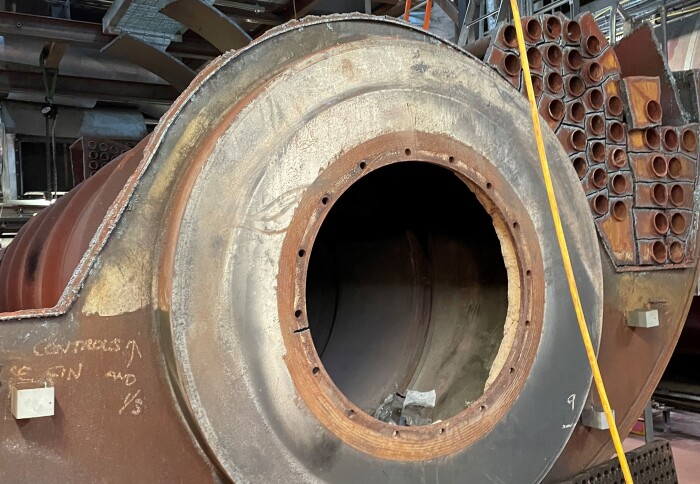De-steam ahead
by Jan Carberry

One of the redundant boilers is removed
Major milestones in the South Kensington Campus 'decarbonisation' project have been reached.
Nine temporary boilers have been delivered and are being installed.
The installation of pipework to bring these boilers into use has begun, starting in Flowers, Chemistry and ACEX buildings. It is also underway in the southern-leg tunnels.
One boiler has already been completely stripped out, work has begun stripping out a second, while work on stripping out a third should start within the next few weeks.
Temporary flues are also now visible outside Skempton and rear of the library.
Meanwhile, in Scotland manufacture of the permanent boilers is underway, while here in London prefabrication of pipework is in hand.
Once all the old boilers are cut from the supply there is no turning back.
To move forward oil will be used during this temporary boiler phase, as it is impossible to take gas to two of the boiler locations. This though, is a lower carbon alternative - hydrotreated vegetable oil (HVO), a paraffinic bio-based liquid fuel originating from many kinds of vegetable oils, as well as animal fats. A 6,000 litre oil tank and a 20,000 litre oil tank hold the fuel for the boilers.
Background
The decarbonisation project is to replace two heat networks with just one, removing 2.74km of pipework. The energy efficiency will reduce the College's carbon footprint by 2,400 tonnes each year and cut the fuel bill by £4m each year; a first of many steps that support not just our own but the UK targets for decarbonisation of heat. College was awarded a £12.3m grant in March 2022 which it is match-funding for the work.
Getting to this stage has required more work than most would be aware of: many site surveys for various reasons, tendering for contractors, planning applications for the numerous consents required, safe removal of asbestos, design of pipework and installation, temporary flues, temporary disconnections, temporary connections, scaffolding, meetings with building users, and all without the luxury of the timescales normally required for a project of this scale and complexity.
Although the works are being undertaken all at once to meet the timescale everything possible is being done to minimise impact and disruption, with works broken down into smaller packages.
Article text (excluding photos or graphics) © Imperial College London.
Photos and graphics subject to third party copyright used with permission or © Imperial College London.
Reporter
Jan Carberry
Estates Division